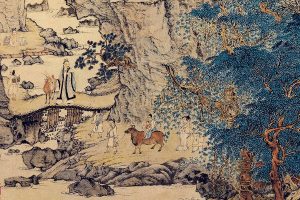抱朴子
卷三•地真
Master Of Embracing Simplicity
Chapter 3• Earth’s Truth
The following excerpt from Ge Hong’s《The Master of Embracing Simplicity》 [bao pu zi 抱朴子] chapter three has been translated as part of a preliminary research about the term Plain and Unadorned [pu su 朴素] [1], a concept at the core of the Daoists Lao Zi and Zhuang Zi:

‘我等不知今人长生之理,古人何独知之?‘‘此盖愚暗之局谈,非达者之用怀也。夫占天文之玄道,步七政之盈缩,论凌犯於既往,审崇替於将来,仰望云物之徵祥,俯定卦兆之休咎,运三棋以定行军之兴亡,推九符而得祸福之分野,乘除一算,以究鬼神之情状,错综六情,而处无端之善否。其根元可考也,形理可求也,而庸才近器,犹不能开学之奥治,至於朴素,徒锐思於糟粕,不能穷测其精微也.
“We do not know the principles of long life for the people of today. How could only the people of ancient times know [of it]?” “This is because it is the talk of the stupid ones and the ones in the dark, [and] does not reach the ones who would use and cherish [it]. Observing the Mysterious Dao of the Heavenly Scripts and stepping on the Seven Regulators’ [1]Progressing and Retreating, [one ought to] consider [their] insult and offence to the past and know the sublime to replace [it] in the future. [One should] look upwards to the clouds’ objects for auspicious evidence and looking downwards to fix the trigrams’ omen of good or bad fortune.
[One ought to] move three chess pieces in order to fix the rise and decay of the employment of the troops. By pushing the Nine Talismans [one will] obtain the boundary [of the realms] of fortune and misfortune. By the multiplication or division of one calculation [one is able to] carefully study the condition of the Corporeal Soul and Spirit, and the intricate and complex Six Emotions [3] . Yet [one] dwells and is situated in the limitless goodness and evilness. Its root origin may be examined [and] the principle of form may be sought, yet mediocre people and [people] close to talents are still unable to commence [their] studies of the mysterious governance. Going so far as [in regards to the] plain and unadorned, the disciple sharply ponders on the useless dregs, [but] is unable to thoroughly survey [its] essence and subtleness.”
[1] Lau explains that Pu [朴] in the《Dao De Jing》 primarily means “the uncarved block is in a state as yet untouched by the artificial interference of human ingenuity and so is a symbol for the original state of man before desire is produced in him by artificial means”. [wikivisually.com/wiki/Pu_(Daoism)]
[2] The Six Regulators are the sun, the moon and the Five Planets.
[3] According to the 《Communion with the White Tiger》 [bai hu tong 白虎通] chapter on the Inner Nature of Emotions [qing xing情性] , the six emotions are happiness, anger, sorrow, joy, love and hatred, [xi nu ai le ai wu喜怒哀乐爱恶].
Would you like to subscribe to our newsletter?
If you enjoyed reading this please consider supporting us!
When we started the Purple Cloud Institute, our aim was to make accessible educational material about traditional Chinese cultural practices. We strive to keep prices of our books as affordable as possible and the content we provide free of charge. However, there are many ongoing behind the scenes costs and the time taken to provide such content is considerable.
If you have enjoyed our offerings please consider donating and supporting us. The help will allow us to make time to bring you more in the way of book publications, podcasts and videos about tradition-based Daoist, Chinese medicine and martial arts and help keep these traditions alive.
Your assistance is greatly appreciated!
